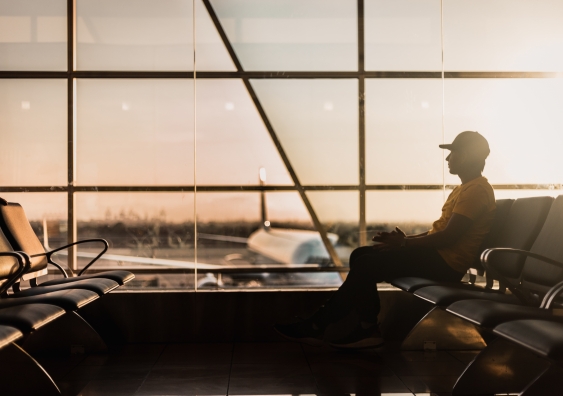New policy brief highlights lessons on airport asylum in the age of COVID-19
Governments can meet their international protection obligations towards refugees without sacrificing public health, says a human rights law expert.
Governments can meet their international protection obligations towards refugees without sacrificing public health, says a human rights law expert.

Dawn Lo
UNSW Media & Content
+61433018180
dawn.lo@unsw.edu.au
Unlike air travel which slowed down dramatically during the pandemic, persecution, conflict and violence did not. In fact, COVID-19 has affected the livelihood and safety of many and forced millions of people across borders to seek protection.
Some governments simply shut them out, says a new policy brief published by the Kaldor Centre for International Refugee Law.
The policy brief is based on research conducted across seven countries (Australia, Canada, Costa Rica, Germany, Mexico, Uganda and the United States) and suggests that some countries are using COVID-19 as cover to entrench obstacles for refugees and people seeking asylum even after the pandemic has passed.
“Governments can meet their international protection obligations towards refugees without sacrificing public health,” says Ms Regina Jefferies, an affiliate of the Kaldor Centre and author of the policy brief. “But that’s not always been the approach they’ve taken.”
When COVID-19 hit last year, Canada, Germany and the United States put in place partial border closures for air arrivals that specifically exempted asylum seekers (with screenings, testing, isolation or quarantine arrangements). Meanwhile, Mexico never resorted to border closures for air arrivals.
Of the countries examined, only Australia, Costa Rica and Uganda closed borders for air arrivals without exception. However, Uganda fully re-opened air travel on 1 October 2020, and Costa Rica on 1 November 2020.
In contrast, Australia has all but eliminated access to asylum for air arrivals – even nearly two years after COVID-19 was declared a global pandemic. Its strict border closure remains in place until at least 15 December 2021.
Air travel has often been cited as a safe alternative for people risking dangerous journeys by sea to Australia, but perversely, the restrictive pandemic policy settings could incentivise irregular movement, undermining Australia’s decade-long crackdown on boats and complicating efforts to detect and control the coronavirus.
Before borders slammed shut, airport asylum procedures in many countries were already lacking in transparency, procedural fairness and accountability.
The policy brief addresses some of these shortcomings and recommends that when border closures are required, they must include specific exemptions for people fleeing a real risk of persecution or other serious harm.
“Governments must ensure that border enforcement agencies do not remove a person who has raised an asylum claim until that person has had access to a fair and efficient procedure for having their claim determined,” says Ms Jefferies.
“A fair and robust process requires that people applying for asylum at an airport are provided with information, legal advice, interpreters and the opportunity for independent review of negative decisions. It also requires a separation between border enforcement and refugee status determination functions.”
The policy brief recommends that refugees and asylum seekers should not be detained, except as a last resort, on the basis of an individualised assessment, and for the shortest possible time. Where detention facilities are used, measures should be in place to reduce the risks of COVID-19 transmission.
“COVID-19 has exposed significant differences in how countries manage public health risk and responsibility-sharing, while recognising the urgency of protecting people in vulnerable circumstances," says Ms Jefferies.
“These recommendations go to safeguarding minimum rights and preventing refoulement, whether there is a pandemic or not.”
The Kaldor Centre’s new policy brief titled ‘Comparative perspectives on airport asylum procedures before and during the COVID-19 pandemic’ is now available.